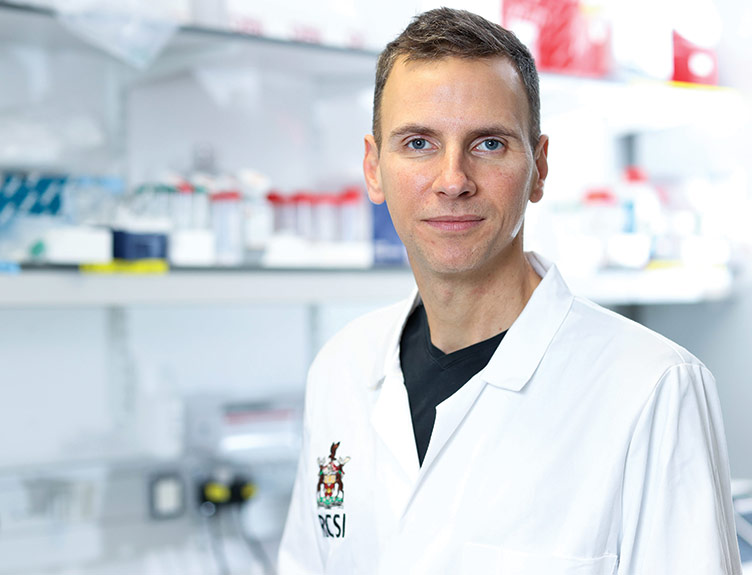Four RCSI researchers among 36 awarded HRB funding
The Minister for Health, Leo Varadkar TD today announced the award of funding of €13.5 million to support 36 new health research projects over the next three to five years.
Projects from RCSI researchers Professor Richard Costello, Professor Jochen Prehn, Professor Fergal O'Brien and Dr Ann Hopkins were among those who were awarded funding provided by the Health Research Board (HRB).
Professor Richard Costello, Department of Medicine, RCSI received funding for his project which aims to improve asthma patient's control over their symptoms by monitoring their inhaler dosages. A device is attached to the individual's inhaler and this identifies when and how the patient has used their inhaler. The project, entitled ‘INCA SUn: A prospective randomised multicentre study to optimise the management of Symptomatically Uncontrolled asthma' will examine the relationship between patient adherence and the changes in their asthma symptoms due to better quality dosages.
Professor Jochen Prehn, Head of the Department of Physiology and Medical Physics, RCSI received funding for his research on developing a new diagnostic tool for patients with cancers of the rectum. This involves a novel diagnostic test which takes into account the complex regulation of tumour cell death in response to radiochemotherapy. The tool will be validated in a larger cohort of rectal cancer patients, and will be improved by investigating whether the inclusion of important genetic and other patient data increases its predictive power. This title of this project is ‘A systems-based patient stratification tool of Bcl-2 family protein interactions to evaluate acute treatment responses in rectal cancer patients'.
A research project, ‘Development of Bioactive Therapeutics Harnessing Stem Cell Mechanobiology' from Professor Fergal O'Brien has Professor of Bioengineering and Regenerative Medicine in RCSI's Department of Anatomy, will also get a grant from the HRB. This research will study the therapeutic potential of placental growth factor and other factors produced by cells in response to physical stimulation. It will also look at the influence of age on these factors as it is well established that children have a remarkable ability for natural wound healing. By identifying how age changes the ability of cells to respond to physical stimulation, bioactive agents capable of harnessing the immense regenerative capacity of children will be identified and incorporated into tissue engineered scaffolds. In doing so, these scaffolds will recapitulate the regenerative capacity of children in the application of therapeutics to promote bone regeneration in adults.
The final RCSI research project to be awarded funding is led by Dr Ann Hopkins, Department of Surgery, RCSI and is titled ‘A multi-pronged translational approach towards testing a novel JAM-A inhibitor to reduce aggressive HER2-dependent breast cancer progression'. This study aims to take a step closer in developing a new drug that will target aggressive tumours in breast cancer. This will build on past research where therapies targeted at these more aggressive forms of cancer have been developed but some patients have become resistant to existing drugs.
Announcing the investment, Minister Varadkar said: “Many of these projects receiving funding today will go on to make a real difference to people's lives, not just in Ireland but around the world. This investment highlights the Government's commitment to developing new research in areas with a clear health benefit, as well as developing new approaches to health care, and boosting the medical science sector. Every treatment, every medical device and every procedure in our health service starts with a good idea that has been proved in practice.”
Speaking at the launch of the awards, Graham Love, Chief Executive at the Health Research Board said: “The HRB focuses on driving more research into policy and practice. This is illustrated by today's investments. Innovation can help bridge the gap between demand for health services and the resources to pay for them. That innovation comes from implementing top class research, which is our raison d'être at the HRB."



